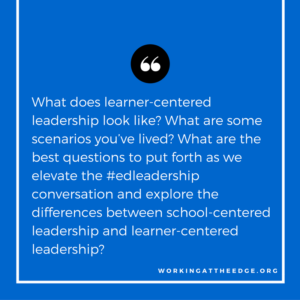 My curiosity on the topic of leadership and learner-centered environments was piqued this past week as I had the opportunity to participate in a convening of superintendents on personalized learning at the White House and Department of Education in Washington, DC. I have never been in a room with so many people thinking about and doing the work – extraordinary work in a host of different contexts. I left inspired and even more committed to the practitioner voice and the value of telling our story.
My curiosity on the topic of leadership and learner-centered environments was piqued this past week as I had the opportunity to participate in a convening of superintendents on personalized learning at the White House and Department of Education in Washington, DC. I have never been in a room with so many people thinking about and doing the work – extraordinary work in a host of different contexts. I left inspired and even more committed to the practitioner voice and the value of telling our story.
There’s a leadership question (or a few) here to explore, and I hope you’ll help me settle on what exactly it is. You’ve probably read a previous post or two about our adoption of a Profile of a Graduate and Learning Beliefs in the Salisbury Township School District. Competency, personalization and learner agency are at the core of this vision. We’re not there yet – that’s why it’s a vision – but I know leadership will play a big part in transforming our system.
As I learned more about deeper learning from my colleagues in DC – how other practitioners define it and are actually implementing it – my curiosity kept returning to leadership. What kind of leadership is required to move a system toward this vision of learning, and how might it be different from the ways we currently frame educational leadership?
In my last blog, I posed this question:
What personal leadership qualities and organizational systems/processes change when a leader intentionally embraces a learner-centered paradigm of leadership as opposed to a school-centered paradigm?
If we understand and believe that the competencies needed to thrive in society and in working life have changed, does it seem logical to believe that leadership competencies have also changed for educational leaders leading a progressive vision for education – moving from a school-centered paradigm to a learner-centered paradigm?
Are these then the next natural questions?
What are the new leadership competencies for leading a learner-centered environment? How do learner-centered leaders shape a learner-centered culture?
Additionally, I wonder how the new Professional Standards for Educational Leaders support leading learner-centered environments. Practitioners wonder why our classrooms and schools have not shifted. Is it time to explore how the defined shifts (reflected in our visions) should first be reflected in how we lead?
What does learner-centered leadership look like to you? What are some scenarios you’ve lived? What are the best questions to put forth as we elevate the #edleadership conversation and explore the differences between school-centered leadership and learner-centered leadership?
Connect with Randy on Twitter and on the TLTalkRadio podcast!
Get new content delivered to your inbox and the ebook 3 Key Principles of Digital Transformation. The ebook contains valuable information from my experience leading a digital transformation and working with a variety of stakeholders over the past decade.
- A silver lining - January 22, 2022
- Is our use of tech working against us? 🤔 - September 8, 2021
- What’s NOT going to change in the next 10 years? 🤔 - September 7, 2021